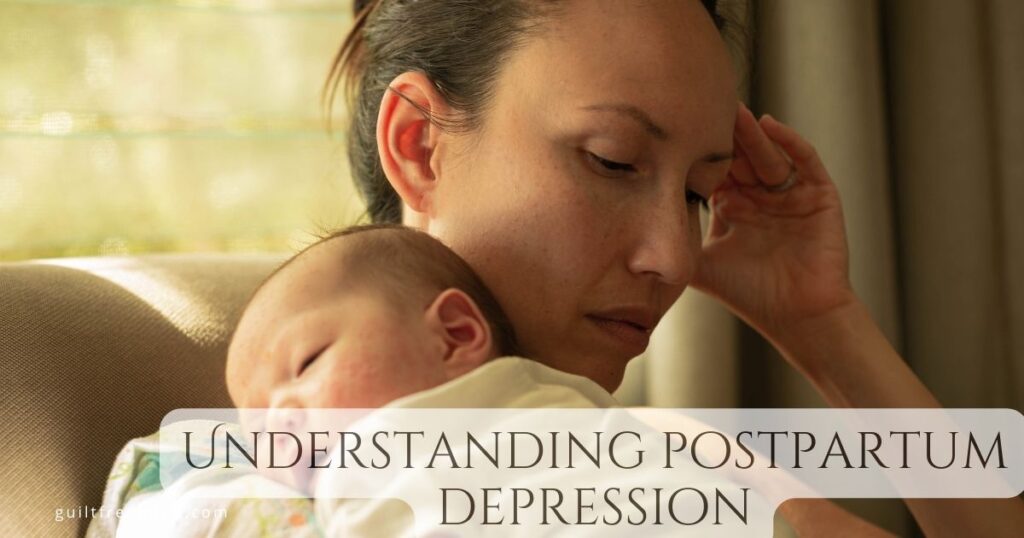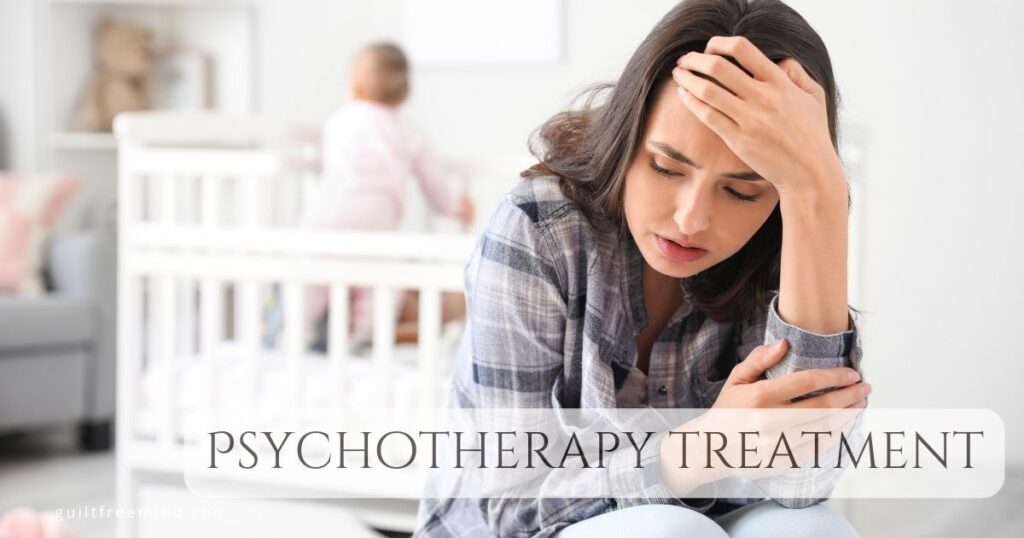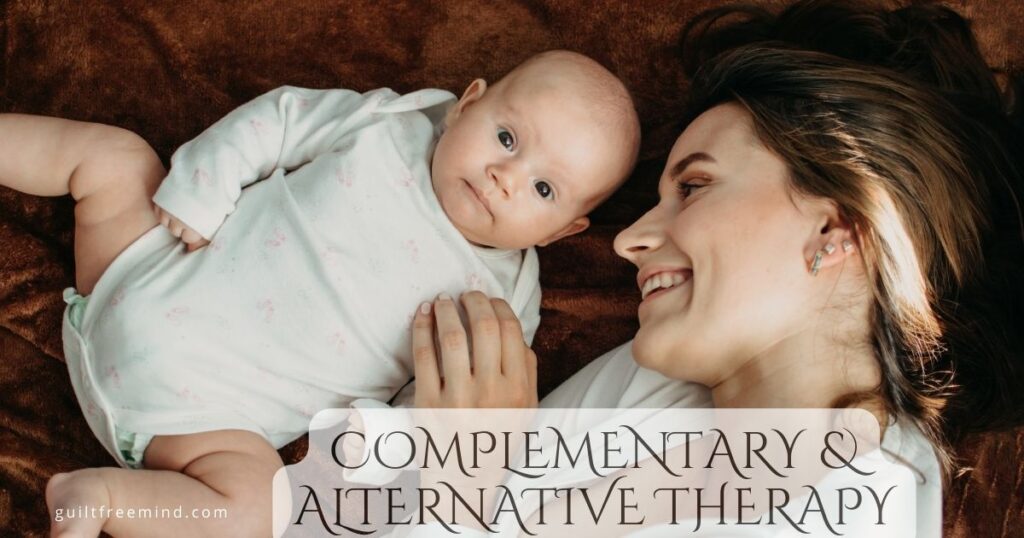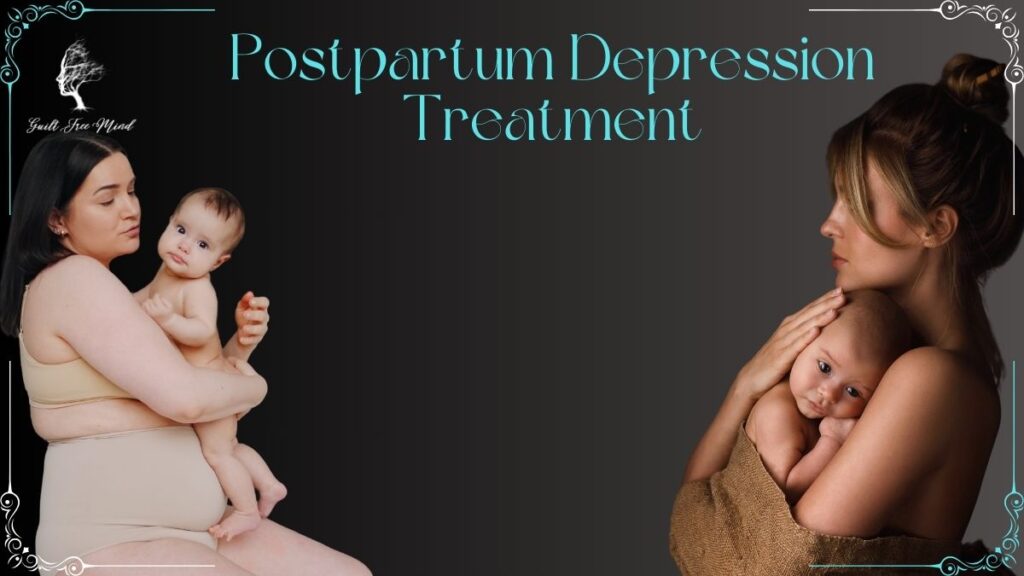In this blog, I have previously discussed many forms of mood disorders. Most of these are a result of unsavory circumstances leading to a chemical imbalance in the brain of the victim. However postpartum depression (PPD) involves bringing a child into this world. This is a type of mood disorder that affects new mothers. It usually occurs within weeks to months after the delivery of the child. This mood disorder is characterized by sudden feelings of anxiety, sadness, and severe exhaustion that starts to interfere with their everyday functioning. Post-partum depression is much more severe and long-lasting that a case of baby blues. This is what makes postpartum depression treatment a non-negotiable option.
In this article, I will discuss all the post-partum depression treatments. I will cover all the options from therapy to medication. This guide focuses on empowering mothers and their supporters with the knowledge they need to navigate through post-partum depression.
If you wish to lead a more positive and fulfilling life, subscribe to the Guilt Free Mind blog. The subscription option is present in the sidebar. Your subscription will allow me to notify you about the release of any new blog post. If you like to watch videos, subscribe to the YouTube channel of Guilt Free Mind. Remember to ring the notification bell, so that YouTube does not miss out on notifying you about the release of new videos from the channel.
Table of Contents
Understanding postpartum depression
Before I discuss the treatment options for postpartum depression, you should understand what postpartum depression is. Postpartum depression is a form of clinical depression that starts after childbirth. It affects new mothers during a very sensitive and challenging time. Most commonly the symptoms of PPD include constant feelings of hopelessness, emptiness, irritability, and sadness. Furthermore, there is a loss of interest in common activities, changes in sleep pattern and appetite, difficulty in understanding and bonding with the baby, absence of energy, overwhelming fatigue, feelings of worthlessness and guilt, and thoughts of causing harm to oneself and the baby. One thing that you must understand is that the symptoms can vary in severity from one person to another. It may also not be recognized by the mother who is suffering.

Risk factors and prevalence
Postpartum depression is more common than you know. It tends to affect approximately 2 in every 7 women who give birth. Even though the exact reason behind PPD may not have been understood, there are some risk factors that boost the chances of a woman suffering from postpartum depression. These risk factors include a history of depression , anxiety, complications during childbirth , hormonal fluctuations and stressful life events during the time of pregnancy or right after birth. Other factors that further contribute to this are lack of social support, complications during pregnancy, financial issues and difficulties in the mother-child relationship.
Impact on the mother, child and families
The effect of PPD extends much beyond the mental and physical health of the mother. It affects the whole family. Mothers who suffer from post-partum depression find it extremely challenging to care for both themselves and the baby. This in turn puts a massive strain on the mother-baby relationship. Children of PPD mothers are at risk of facing developmental delays, difficulty in forming attachments securely, and finally behavioral issues. Furthermore, PPD places a huge strain on the relationship between partners, friends, and family members. People around them may find it very difficult to provide support to the affected mother, Understanding the finer and distant effects of PPD is crucial for comprehensive treatment and early intervention.
Approaches to postpartum depression treatment
Medical treatments
Antidepressant medications
Antidepressant medications like serotonin reuptake inhibitors (SSRIs) are the most commonly prescribed drugs for post-partum depression treatment. These medications work by helping balance out the neurotransmitter levels in the brain of the person. This in turn helps alleviate the symptoms. Women and mothers must discuss and understand the benefits and risks of using antidepressants, especially if they are breastfeeding the child.
Hormonal therapy
The time during and after pregnancy is a hormonal roller coaster for the mother. The fluctuations in hormone levels can be a huge contributor to the development of postpartum depression. The use of hormonal therapy like hormone-based contraceptives and estrogen replacement therapy may be prescribed by the medical practitioner to help regulate the hormone levels and improve the mood of the mother.
Other supplements and medications
Along with anti-depressants, the mental health practitioner may prescribe others supplements or medications to help manage the symptoms of postpartum depression like anti-anxiety or insomnia medicines to keep them from spiraling into excess worry. It is crucial fat women to first consult with their healthcare provider before they start on any new supplement or medication.
Psychotherapy for postpartum depression treatment

Cognitive behavioral therapy (CBT):
Cognitive behavioral therapy or CBT is a form of psychotherapy that specifically focuses on challenging and identifying the negative thought patterns and the behaviors that are associated with post-partum depression. Via the use of structured sessions guided by the therapist, such mothers learn various coping strategies and many practical skills that can help them manage their symptoms and boost their overall well-being.
Interpersonal Therapy
Interpersonal therapy or IPT is a short-term therapy technique. It focuses on addressing the relationships and interpersonal issues that may be acting as a contributing factor towards depression. when these communication patterns are explored, conflicts are resolved. It also boosts the social support of this person and in turn helps to alleviate the symptoms of depression and helps with the interpersonal well- being.
Support groups
Support groups are an excellent way to communicate and meet up with others who might be experiencing similar issues. Here mothers can meet other mothers who are suffering from post partum depression as well so they can receive proper emotional support, validation and finally encouragement. Most often support groups are led by trained peers or facilitators that can provide you a sense of belonging and community.
Changes in self-care and lifestyle for postpartum depression treatment
Exercise and nutrition
A balanced diet is crucial for anyone suffering from depression. However, for mothers suffering from post-partum depression, it is even more crucial to have a balanced diet full of nutrient-rich food and proper exercise. These can have an enormous positive impact on the mood or overall well-being. When you exercise regularly, it causes the production of endorphins which act as natural mood lifters. On the other hand, a healthy diet provides critical nutrients needed for optimal brain function.

Sleep hygiene
If mothers suffering from postpartum depression wish to come out of their condition and lead a healthy life, they should focus on their sleep hygiene. Those suffering from depression need a proper sleep schedule, follow their bedtime routines every day and minimize disruptions before and during sleep him. This can improve their sleep quality and reduce, irritability and fatigue.
Stress management
Managing stress is a crucial part of handling and managing any mood related disorders. Focus on using various stress management methods like deep breathing exercises, mindfulness, meditation and progressive muscle relaxation. These techniques can help reduce the feelings of overwhelm and anxiety that are most commonly associated with postpartum depression. Look for healing ways to get rid of the stress like focusing on your hobbies, creative activities or anything else that boosts your creative side and allows you to relax and help with your emotional well-being.
Support system and mental health resources for postpartum depression treatment
Mental health professionals and other healthcare providers
Gynaecologists / Obstetricians (GYN/OB)
Your mental health provider like obstetrician or Gynaecologists can be a big help in helping you handle your post-partum depression. They can help you by conducting the initial screenings, suggest you.proper post-partum care and provide you guidance regarding various treatment options. Furthermore, they can also help refer you to good mental health professionals who have expertise in handling cases such as yours.
Psychiatrists
The other specialists who handle cases of post-partum depression treatment are psychiatrists. Such mental health providers specialize in postpartum depression treatment. They can prescribe the necessary medications for your condition, monitor the progress of your treatment, and finally, they are equipped to provide you counseling or psychotherapy, depending on your condition and needs.
Therapists and Psychologists
Psychologists and licensed therapists can provide you with a wide range of therapeutic interventions. They can also provide you with a safe space where you can discuss your problems, thoughts, and feelings without worrying about judgment, Some of the therapeutic interventions that may be employed are cognitive behavioral therapy (CBT) or interpersonal therapy (IPT). These forms of treatments can help you easily cope with your postpartum depression and also work with you to develop coping strategies to deal with future problems.
Friends and family

Partner/ Spouse
When one is suffering from any form of depression, their partners have a crucial role in helping them. Your partner needs to be your pillar and support when you through the postpartum depression treatment. They can help you out by providing you with emotional support, helping with the household tasks and sharing the responsibilities of childcare. They can also encourage you to keep going for therapy and treatment continuance.
Family Members
After your partner, the next set of people who have a pivotal role in your recovery are your family members. They can either be your parents, close relatives are siblings. Such people can provide you with emotional assistance or emotional support when you go through your postpartum period. As it is said, “It takes a village to care for a baby.” your family members can help you smoothly run errands, help with the baby and finally allow you to focus on yourself and self-care.
Peer support and friends
The final group of people who can provide you a safe and non-judgemental space are your peers and friends. They can hear your woes out with empathy and provide you companionship when times get hard. The support you get from your friends and peers can alleviate the feelings of isolation. They can also help you distract yourself and provide you with opportunities to relax.
Support groups and online communities
Discussion boards and online forums
There are many online forums and group discussion boards that are dedicated to postpartum depression treatment. These can offer you a platform where different people who are suffering from similar conditions can connect, exchange their perspectives, help out one another, and share advice. These communities are the safest places for sharing your experiences and offering support to others.
Social media groups
Many social media platforms provide pages and groups that are specifically focused on postpartum depression treatment. At such sites, individuals can easily find proper resources, and information and receive support and encouragement from professionals and peers.
Complementary and Alternative therapies
Acupuncture
One of the traditional cluster therapies used in postpartum depression treatment is acupuncture. This form of therapy involves inserting needles into specific points in the body of the person to stimulate proper blood flow, energy flow, and balance. In some cases, women undergoing postpartum depression treatment may find acupuncture therapy to be very helpful. It is also a huge help in reducing the symptoms of past pautions depression like fatigue, anxiety, and insomnia.

Benefits of acupuncture
Acupuncture is also amazing at regulating the mood of the person and providing melatonin, reducing the level of stress hormones and boosting the release of endorphins which act as the body’s natural painkiller. This form of therapy has also been shown to improve sleep quality and overall well-being. Huss are crucial aspects in managing the signs and symptoms of postpartum depression.
Massage therapy
Acupuncture is not the only traditional therapy that can be used for postpartum depression treatment. You can also opt for massage therapy. Massaging involves kneading and manipulating the muscles and tissues to promote relaxation, relieve the tension from the body and finally reduce physical discomfort that you may feel after spending a whole day running after your baby. Postpartum massage therapy focuses on targeting areas of the body that feel a lot of soreness and tension and provides the new mothers with a nurturing experience.
Benefits of massage therapy
The other benefit of opting for massage therapy is that it can help reduce the signs and symptoms of depression and promotes relaxation, reduces stress hormones. It also boosts the feelings of well -being and hope. It also boosts the overall body circulation, helps make sleep quality better and also increases the release of oxytocin, a hormone that is responsible for relaxation and bonding.
Mindfulness practices and yoga
Yoga and mindfulness involves moving gently through the motions, focussing on breathwork and using meditation techniques to cultivate your awareness, reduces stress and promotes relaxation throughout the body. These practices and motions can be adapted so they can suit the needs of the postpartum mother. they can also provide entremely valuable tools to help manage their mood and help them cope with the stressors-
Benefits
Mindfulness and yoga can help those suffering from postpartum depression by boosting relanation, lowering the anniely levels and overall helping with the mood improvement. Regularly practicing mindfulness and yoga can help enhance the self awareness of the person , boost feelings of self compassion and finally, providing a sense of control and empowerment over one’s emotional and mental well-being.
Herbal supplements and remedies
In some cases, women also consider opting for herbal remedies and supplements to ease them through this difficult time. These can help them navigate the difficulties of their mental health during the difficult postpartum period. Some common supplements include omega 3 fatty acids, minerals and multivitamins.

Benefits
Even though the research on the efficacy and effectiveness of herbal supplements and remedies in case of postpartum depression treatment is limited, certain studies have shown that some of the supplements like Omega-3- fatty acids can also have mood-stabilizing effects on the person. If you choose to opt for supplements and herbed options, talk to your doctor beforehand. Your other medications may interfere with the new ones. So be careful and always consult your practitioner beforehand.
One thing you must remember is that these complementary therapies are only adjuncts. They cannot act as replacements for the evidence-based treatments like psychotherapy and medication. This is why it is crucial for women going through postpartum depression treatment to seek guidance regarding alternative therapies and whether they safely add to their treatment plan.
Coping skills for managing and coping during postpartum depression treatment
Development of coping skills
- Focus on practicing meditation, mindfulness progressive muscle relaxation and deep breathing exercises to help you cope with the stress of everyday life and boost relaxation.
- Learn how to effectively solve problems so you can find solutions to your everyday challenges and regular stressors-
- The final thing to focus on is how to manage intense emotions. For this you can practice self-soothing techniques and engage in tasks that provide you comfort and joy.
Get realistic expectations
Understand the importance of self-care. Allocate specific time for tasks that nurture you and help you with your well-being, like eating meals that will nourish your body and finally exagging in tasks that you like and enjoy.
Be realistic and focus on what you can achieve. What all can you get done in one day. Even if you cannot get everything done, be kind to yourself, someday it is hard to finish all the tasks and that is okay. Put in small achievable goals in your daily tests that you can finish on the same day. Do not forget to celebrate your achievements.
Reach out to your friends and family for support. Ask for help when you need it. Take help from your loved ones for help with household tasks, childcare support and help with emotional navigation.
Communicate with your loved ones.

Honest and open communication
If you are not honest, you cannot count on your close ones for your support. Share your feelings, thoughts and problems with your loved ones like your family members, partner or those close to you. Be honest- regarding your needs and struggles. Also let them know what it is they can do to be supportive and help you.
Set your boundaries
Your mental and physical well being depends on establishing and maintaining your boundaries- Make sure that you have proper boundaries and everyone arown you respects you. Communicate to your loved ones about your preferences and needs . Be assertive eis your desicios and do not be afraid to say NO, if there are additional responsibilities that are making you feel overwhelmed.
Educate your loved ones
Your loved ones may or may not be aware of the signs, symptoms and finally post- partum depression treatment. Thus, this responsibility falls squarely on your shoulders. You must educate those close to you about this condition, the signs, symptoms and treatment methods- Help the others understand what you are going through and how they can be your best- supporters on your journey.
Establishing a supportive environment.
Surround yourself with positivity
Surround yourself with people who love and support you. stay away from toxic or negative influences. Use lifting music, supportive family and friends and inspirational quotes. You can also read the autobiographies of others who have been through similar experiences. Those who bring you down do not belong in your life anymore.
Limit your exposure to triggers
Find out the triggues that tend to increase the signs of postpartum depression. A part of post-partum treatment is identifying what boosts your symptoms and purposefully staying away from the triggers. Keep yourself away from the things that hinder your postpartum depression treatment like stressful environments and negative news. Anything that stresses you out should not be a part of your immediate environment.
Opt for professional help
Sometimes , in very serious cases of postpartum depression, support and self-care measures are not enough. Under such conditions, do not hesitate to reach out to professionals who are experts at dealing with such mental health issues. Go to a therapist or counselor so you can have help in your postpartum depression treatment. They can weaponize you with various coping methods, provide you with psychoeducational, and finally provide you with personalized treatment methods so your recovery can go much faster.
Overcoming the barriers to post-partum depression treatment

Handling the stigma surrounding mental health
Awareness and Education
Start by challenging the stigma and misconceptions that most commonly surround post partum depression treatment. You can do so by educating yourself first and they others regarding this mental health condition. Share personal anecdotes, resources and other forms of information that can help reduce stigma and honest- mental health.
Normalise seeking help
Encourage those around you to talk and discuss about mental health. Promote treatment seeking and talk to them about seeking help if they are facing depression, Show them that opting for treatment does not indicate weakness . on the other hand, it is actually a sign of power and strength.
Community Support
for support, you can turn to online support groups, discussion panels in other advocacy organisation that focus on post partum depression treatment.. These
organisations are responsible for boosting mental health awareness and reducing stigma associated with mental health conditions.
Limited access to mental health resources
Focus on alternative resources
If you are not able to access mental health resources, go for community-based clinic options. You can also opt for online resources or non-profit organizations that are focused on providing sliding-scale or low cost mental health services. some of these organizations may also provide telehealth options for those needing postpartum depression treatment.
Use support hotlines
make use of hollers and support helplines that have expert professionals who can easily equip you with information, support and resources for postpartum depression treatment. They can also direct you towards good mental healthcare providers.
Advocate for policy change
Promote and advocate for a change in policy towards ones that boost the provision of mental health care at local, state as well as national levels. work with others to promote the release of initiatives and support policies that can expand access of everyone to affordable mental health options for every person irrespective of insurance or ‘income status-
Working around the financial constraints for postpartum depression treatment

Opt for financial assistance
Ask about the availability of financial assistance programs, payment plans or sliding scale fees provided by mental health clinics or health care providers. Some organisations may also provide scholarships or grants that are meant specifically for those who need postpartum depression treatment.
Explores insurance coverage
Go through your insurance policy. check if your policy covers mental health services like medication , therapy or other post partum depression treatment options. Tense coverages usually include therapy, medication or other treatment modalities. If your insurance does not cover mental health then advocate for better coverage.
Check for telehealth options
Virtual therapy and other telehealth options can be explored if the traditional methods make it difficult for you to attend regular therapy, These options might be more affordable and accessible compared to the braditional in -person counselling methods, These options are also much more cost-effective.
Societal and Cultural influences on postpartum depression treatment
Cultural Sensitivity
Find out experts in the field of mental health who have a high experience in dealing with post partum depression treatment with those who belong to diverse cultural backgrounds. are also good at working with individuals who understand the cultural variations that can significantly impact the person’s motherhood and mental health experience.
Support from family
Talk to your family members about post partum depression treatment. If they are not aware then educate them about the same . Tell them about your needs and past experiences . Ask them for support regarding getting proper care and combating this mental health issue.
Engagement from the community
Start participating in religious and cultural communities that focus on putting priority on mental health support and awareness. Furthermore, promotes cultural competence and mental health inclusivity in these communities. This will help reduce the stigma surrounding mental health and also boost- access of individuals towards mental health for those with postpartum depression.

Conclusion
Post-partum depression can be difficult but definitely not impossible to navigate through. The journey towards recovery can be challenging but you are not alone in your journey. By focussing on post-partum depression treatment and using strategies to cope and handle the symptoms, you can easily overcome the barriers of your mental health condition and finally reclaim your well-being and mental health,
Asking for postpartum depression treatment or help regarding the same is not a sign of weakness at all. On the other hand, it is a sign of being courageous and focusing on your recovery. whether you opt for medication, therapy, or other alternative therapies, there are a variety of resources to help you combat your problem and help you on your journey.
As you embark on your path of self-healing, focus on prioritizing your self-care, take support from your loved ones and celebrate your progress at every step. It doesn’t matter how small the progress is, it should always be celebrated. With proper levels of resilience, support, and determination, you can easily overcome post-partum depression and embrace all the joys of being a mother with strength and confidence.
If you wish to lead a positive and fulfilling life, subscribe to Guilt Fun Mind. The subscription option is present in the sideline. If you like watching videos, subscribe to the YouTube channel of Guilt Free Mind. Remember to ring the notification bell and set it to ALL so that YouTube does not miss out on notifying you about the latest video releases on the channel. If you have any queries about this blog post or any other on Guilt Free Mind, feel free to put them in the comment section. I will be happy to help.
See you in my next blog post
Frequently Asked Questions
Medication (usually antidepressants), therapy (including cognitive-behavioral therapy), support groups, lifestyle modifications, and, in extreme circumstances, hospitalization are common ways to treat PPD.
Treatment for postpartum depression has shown promising results, using cognitive-behavioral therapy (CBT) in particular. The program aids in the recognition of negative thought patterns, the creation of coping mechanisms, and the enhancement of general mental health.
It is crucial to contact with a healthcare expert to establish the best option for breastfeeding women, but many antidepressants are safe. Because of their reduced likelihood of entering into breast milk, selective serotonin reuptake inhibitors (SSRIs) are frequently given.
Indeed, medication is not always necessary to address postpartum depression. Effective non-pharmaceutical methods of controlling PPD include therapy, support groups, lifestyle modifications (including exercise, healthy eating, and enough sleep), and building a solid support system.
How long it takes to cure postpartum depression depends on how well the patient responds to medication, therapy, and other approaches. The time it takes to alleviate symptoms can vary from a few months for some to a year or more for others. Maintaining treatment until symptoms substantially improve and scheduling frequent check-ins with healthcare experts to assess progress and make adjustments to treatment plans as necessary are of the utmost importance.
